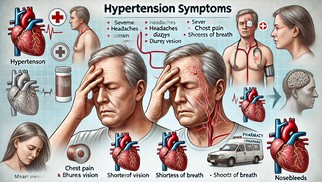Hypertension: Understanding, Causes, Management, and Treatment


Hypertension, commonly referred to as high blood pressure, is a prevalent medical condition that affects millions worldwide. Despite its widespread occurrence, many people remain unaware of its serious implications and how to manage it effectively. This article aims to provide an in-depth understanding of hypertension, its causes, ways to bring blood pressure down, prevention strategies, and a closer look at the treatment option Zestril.
What is the Meaning of Hypertension?
Hypertension is a condition characterized by consistently elevated blood pressure levels. Blood pressure is the force exerted by the blood against the walls of the arteries as the heart pumps it throughout the body. It is measured in two values: systolic pressure (the pressure when the heart contracts) and diastolic pressure (the pressure when the heart relaxes).
A normal blood pressure reading is generally considered to be around 120/80 mmHg. Hypertension is diagnosed when blood pressure consistently exceeds 130/80 mmHg, according to guidelines by organizations like the American Heart Association (AHA). There are two main types of hypertension: primary (essential) hypertension, which develops gradually over many years without an identifiable cause, and secondary hypertension, which arises due to underlying conditions such as kidney disease or hormonal disorders. If left untreated, hypertension can lead to severe complications, including heart disease, stroke, kidney failure, and vision problems. Hence, early detection and management are crucial.
What is the Main Cause of Hypertension?
The causes of hypertension can vary. For primary hypertension, factors such as genetics, age, lifestyle choices, and stress contribute significantly. A family history of high blood pressure increases the likelihood of developing the condition. Age is another important factor, as the risk of hypertension rises, particularly after the age of 60. Lifestyle factors, including poor dietary habits, high salt intake, excessive alcohol consumption, and physical inactivity, also play a major role. Stress, especially when chronic, can exacerbate blood pressure levels.
Secondary hypertension, on the other hand, results from identifiable medical conditions or medication side effects. Conditions such as kidney disease, adrenal gland tumors, thyroid problems, or obstructive sleep apnea can lead to secondary hypertension. Certain medications, such as nonsteroidal anti-inflammatory drugs (NSAIDs) and birth control pills, can also contribute to elevated blood pressure. Identifying and addressing the underlying cause is essential in managing secondary hypertension effectively.
Risk Factors of Hypertension
Several risk factors contribute to the development of hypertension, encompassing both modifiable and non-modifiable elements. Non-modifiable risk factors include age, as the likelihood of developing hypertension increases as people grow older. Genetic predisposition also plays a significant role; individuals with a family history of hypertension are at greater risk. Ethnicity is another factor, with studies indicating that certain groups, such as African Americans, are more prone to high blood pressure and its complications.Modifiable risk factors are those that individuals can address through lifestyle changes. Excessive sodium intake, commonly associated with processed and fast foods, is a leading contributor to elevated blood pressure. Similarly, diets low in potassium, magnesium, and calcium may increase hypertension risk. Obesity and physical inactivity often go hand in hand and are significant drivers of high blood pressure, as they place additional strain on the heart and circulatory system. Stress, when persistent, can contribute to sustained increases in blood pressure, particularly when individuals cope with stress through unhealthy habits like overeating, smoking, or drinking alcohol. Smoking, in particular, not only raises blood pressure temporarily but also damages blood vessels over time, compounding cardiovascular risks. Excessive alcohol consumption is another lifestyle factor that exacerbates hypertension. By addressing these modifiable risk factors through dietary improvements, regular exercise, and stress management, individuals can substantially reduce their likelihood of developing hypertension or mitigate its severity if already diagnosed.
What Brings Blood Pressure Down?
Managing high blood pressure requires a combination of lifestyle changes, dietary adjustments, and in some cases, medications. A healthy diet, such as the DASH (Dietary Approaches to Stop Hypertension) diet, plays a crucial role in lowering blood pressure. This diet emphasizes fruits, vegetables, whole grains, lean proteins, and low-fat dairy products while reducing sodium intake. Limiting processed and packaged foods helps minimize hidden salts in the diet.
Physical activity is another cornerstone of blood pressure management. Engaging in regular moderate-intensity aerobic activities, such as brisk walking, cycling, or swimming, strengthens the heart and improves circulation. Combining this with strength training exercises enhances overall cardiovascular health.
Weight management is equally important, as even a modest weight loss of 5-10% can significantly reduce blood pressure. Stress management techniques, such as yoga, meditation, and deep breathing exercises, help lower temporary spikes in blood pressure and improve overall well-being. Additionally, reducing alcohol consumption and avoiding smoking contribute to better blood pressure control and overall cardiovascular health. For those who do not achieve sufficient results with lifestyle changes alone, healthcare providers may prescribe medications, including ACE inhibitors, beta-blockers, diuretics, or calcium channel blockers.
Prevention of Hypertension
Preventing hypertension requires a proactive approach to maintaining optimal blood pressure levels. Regular monitoring is essential, particularly for individuals with risk factors such as a family history of hypertension or advanced age. Home monitoring devices can provide valuable insights into daily blood pressure patterns.
Adopting a heart-healthy lifestyle, which includes a balanced diet, regular physical activity, and weight management, is key to prevention. Eliminating tobacco use and limiting alcohol consumption further reduces risk. Stress management is another critical factor. By learning effective coping strategies and prioritizing sleep, individuals can minimize the long-term effects of stress on blood pressure. Routine health check-ups provide an opportunity to discuss any concerns with healthcare providers and ensure early detection and intervention.
Treatment with Zestril
Zestril, also known by its generic name lisinopril, is an angiotensin-converting enzyme (ACE) inhibitor commonly prescribed to treat hypertension. By relaxing blood vessels, it facilitates smoother blood flow, lowers vascular resistance, and reduces overall blood pressure levels.
Zestril is typically taken once daily, with or without food. The dosage is tailored to the patient’s specific needs and medical condition. For adults with hypertension, the usual starting dose is 10 mg per day, which can be adjusted based on response to treatment. Consistency in taking Zestril as prescribed is crucial to avoid complications such as rebound hypertension.
This medication offers several benefits. It effectively manages blood pressure, reducing the risk of complications like heart attack, stroke, and kidney damage. Zestril also provides additional heart and kidney protection, particularly for patients with diabetes or those recovering from a heart attack. While it is generally well-tolerated, some patients may experience side effects, including dizziness, fatigue, or a persistent dry cough. Rarely, more severe reactions such as angioedema may occur, necessitating immediate medical attention.
Patients using Zestril should undergo regular monitoring to assess kidney function and potassium levels. Pregnant women should avoid this medication, as it can harm the developing fetus. Additionally, individuals must inform their healthcare provider of all medications or supplements they are taking to avoid potential drug interactions.
Conclusion
Hypertension is a silent yet serious condition that demands attention and proactive management. Understanding its causes and adopting a heart-healthy lifestyle are vital steps in controlling blood pressure and preventing complications. Medications like Zestril play a pivotal role in hypertension management, offering effective control and reducing the risk of severe outcomes. By combining medical treatment with lifestyle modifications, individuals can achieve better health and lead a life free from the burdens of uncontrolled hypertension.
Medically Reviewed by Dr. Mevan Nandaka Wijetunga, MD
(Updated at Jan 8 / 2025)
Zestril Lisinopril articles:
Some of the trademarks used in this Web Site appear for identification purposes only.
All orders are reviewed by a licensed physician and pharmacist before being dispensed and shipped.
The statements contained herein are not intended to diagnose, treat, cure or prevent disease. The statements are for informational purposes only and is it not meant to replace the services or recommendations of a physician or qualified health care practitioner. If you have questions about the drugs you are taking, check with your doctor, nurse, or pharmacist.

